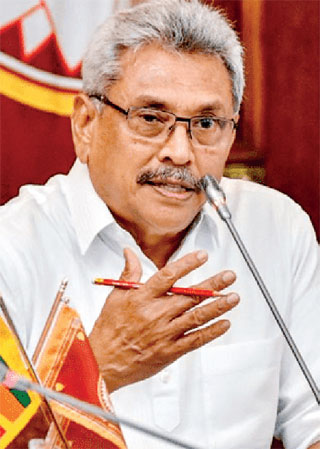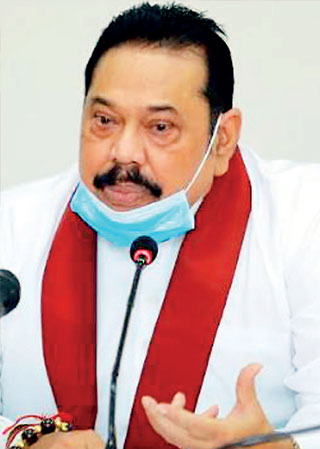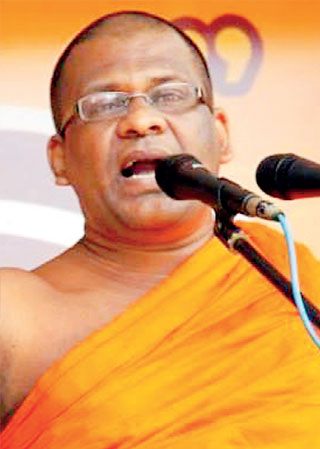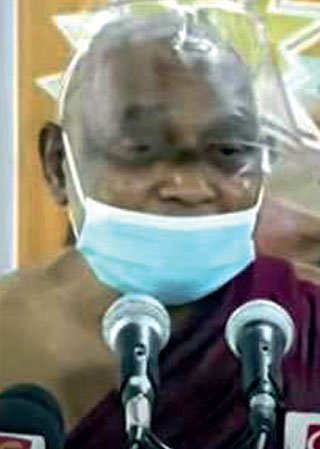Tuesday Feb 17, 2026
Tuesday Feb 17, 2026
Wednesday, 8 December 2021 00:05 - - {{hitsCtrl.values.hits}}

President Gotabaya Rajapaksa

Prime Minister Mahinda Rajapaksa

Galagoda Aththe Gnanasara Thero

Getamanne Dhammalankara Thero
|
“The road to self-deception is narrow to begin with, but there’s always someone ready to broaden it out...it’s all a matter of beginning” – José Saramago (Cain)
By Tisaranee Gunasekara
Call it a metaphorical warning shot. Several parliamentarians, including a presidential nephew, were at a public meeting in Hakmana (Matara) when a monk invaded the stage and made a speech.
“What did this Government do for the country?” he asked in a purely rhetorical spirit. Commenting on the regime’s failure, he proffered his answer: “Not this nonsensical (bahubootha) democracy, but if (you) love the motherland, the people, Mr. Gotabaya, hand over the country to the military for the next 10 years...”
The monk’s sincerity couldn’t be doubted. He was one of the 6.9 million, a true believer who embraced Gotabaya Rajapaksa as ‘Our Hero Who Works’. His words came from a place of pain, the ‘remedy’ he suggested was a desperate response to despair.
His intervention is symbolic of the steady undermining of the edifice of Rajapaksa power at its base. Other signs include a growing string of defeats suffered by the SLPP at the level of Pradeshiya Sabhas and cooperative societies. The bottom is giving away.
The Government is increasingly seen as incapable of governing. But no Opposition party or personality is seen as capable of stepping into the breach. The result is a gap at the heart of the system. This is the context in which the remarks by the Hakmana monk should be considered. He is not one of the popular saffron firebrands, but an average monk with no national profile or grand agenda. This is what makes his publicly suggested ‘military solution’ for the woes of Rajapaksa rule a matter of serious concern.
Sri Lanka got pretty much everything wrong in her post-independence history. But we still got one important thing right – keeping the military out of politics. Lankan voters are no strangers to disappointment, even despair. But they always found a solution within the democratic system. Lankan military too did not show an inclination to dabble in politics (the two aborted coups in the 1960’s were thus paltry affairs). Voters didn’t regard the military as the solution to governance problems, and the military did not see itself as a political saviour.
The undermining of these invisible guardrails started under the presidency of Mahinda Rajapaksa. In an absolute first, several top military commanders appeared on State television in their uniforms and praised candidate Rajapaksa during the 2010 Presidential Election. Even more significant was the creation of the cult of ‘war hero,’ bestowing on the uniformed man a sacrosanct status near equal to the one enjoyed by Buddhist clergy (actual soldiers were mostly treated like cannon-fodder and unpaid labour).
The habit of venerating the saffron robe, irrespective of the qualities of the wearer is clearly an old one. In an editorial written in the Lak Mini Pahana of 30 November 1934, Munidasa Kumaratunga warns against this practice. Venerating the ‘guise/appearance’ should be limited to the theatre, he points out; if the practice of worshipping the saffron robe irrespective of the qualities of the wearer persists, we will end up by worshipping saffron robes on clothes lines, he warns.
The Rajapaksas not only embraced this old habit but created a deadly new one with the cult of the war hero. The final Eelam War became a Humanitarian Offensive with zero-civilian casualties, and the war hero became a moral and practical superman whose every deed was right and good. The military was depicted as the ultimate repository of efficiency, honesty, capability, and of course morality.
“Our aim is to produce a learned citizen who has gained physical and mental discipline coupled with positive attitudes and love for the country,” President Mahinda proclaimed at the commencement of first ever ‘Leadership training programme’ for university students in 2011 (Daily News – 24 May 2011). Soon all kinds of civilians were being herded into army camps for Leadership Training, including principals of Government schools who were awarded brevet ranks. The ‘Api Army’ programme which aimed to recruit professionals into the military as volunteers could not be implemented because the Rajapaksas were defeated in 2015.
This recasting of the military as virtuous and efficient supermen was a cynical ploy aimed at strengthening Rajapaksa power. But large swathes of the Rajapaksa base, both lay and ordained, would have internalised this myth. As the Rajapaksas careen from failure to greater failure, these segments might start looking to the uniformed supermen as the alternative. If so, the Rajapaksa nightmare might be succeeded not by something rather less nightmarish but something infinitely more so.
Dangerous dichotomies
In Sri Lanka, stocks are soaring while the rupee and forex-reserves plummet. The stock market is blooming with health and vigour. The economy has never been sicker.
The Rajapaksas probably think that the stock market reflects the real economy, just as they believed – and probably still believe - that a government could print money with no adverse economic consequences. Lacking even a basic understanding of economics, they were/are vulnerable to any crackpot theory.
Media reports claim that at a cabinet meeting held on 7 October, President Gotabaya Rajapaksa admitted his lack of political experience and asked older brother Mahinda to become more politically involved. He reportedly said that as president he was gaining political experience. This was the man who summoned top Central Bank officials and gave them a televised dressing down, telling them to come up with a new toolkit. While he is trying to gain experience on the job, a crash helmet has become a necessary accessory for cooking with gas.
Unreality rules, in big ways and small. The Central Bank Governor lives in a dream where a huge influx of dollars is about to pour into his coffers saving the artificially inflated rupee. In a country where increasing numbers of people lack access to three or even two square meals, the regime prioritises walking tracks. In Koskale, Dambulla, shops were demolished (adding to unemployment, loss of income, poverty, etc.) to build a walking track; the Dikwella beach was vandalised for the same purpose.
As the economy craters, the law is being turned into a joke. A secretary to the minister in charge of the Police has been caught gold digging, literally. The AG’s Department busies itself saving Rajapaksa acolytes and punishing Rajapaksa opponents. Former Navy Commander Wasantha Karannagoda was released from the case of abducting 11 young men and the Head of Avant-Garde was released from the floating armoury case, while Hejaaz Hisbullah has completed 600 days in captivity.
Nothing casts a light on the Rajapaksa attempts to debase both law and Buddhism than the recent shenanigans of the monk Galagoda Aththe Gnanasara.
A monk by the name of Thapovane Rathana Thero had, as part of a weekly dhamma discussion on Facebook, been critical of monks dabbling in politics. Gotabaya Rajapaksa’s handpicked lawgiver took exception to this remark. He called Rathana Thero and went on a rant replete with Sinhala obscenities. Dog was the politest form of address the Head of the Taskforce on One Country, One Law used.
Some of his more printable gems include, “There is no difference between you and the thambi” (a derogatory term used for Lankan Muslims); “If you want to meditate in the jungle do it. If you want to attain nibbana do it. Immediately remove the video. Or (I) will smash you to the ground.” (https://www.youtube.com/watch?v=d8UD5mO7vR8 from about 31.00 to 34.00)
This is the person who the President handpicked to head his Taskforce on One Country, One Law.
Recently the production manager of the State-owned Litro Gas admitted that the company did change the composition of gas and released some samples to the market. In other words, the State-owned Litro experimented with the lives of the people.
Just like the Rajapaksas are doing.
Mocking the Rajapaksas seems to be a favourite activity of many social media users. A growing number of disgruntled Rajapaksa voters seem to attribute everything that is wrong to Rajapaksas’ ‘lack of toughness.’ These critics bemoan President Gotabaya’s inability to turn into a Putin or even a Hitler. This psycho-political masochism is a part of a global current, the idealising of “a twisted version of ‘toughness’ as the highest ideal” (The new right’s strange and dangerous cult of toughness – The Atlantic – 1 December 2021). In this rendering decency, kindness, compassion, even intelligence is weak and effete; brutality, intolerance, and mindless violence are desired, especially in dealing with perceived threats and enemies.
The perceived nature of a problem often has a determining influence on the solution. If a large chunk of Lankan voters wrongly attribute everything that is wrong to the ‘weakness’ of the rulers, they will focus their efforts on finding a ‘tough’ alternative.
The Hakmana monk obviously attributes all current woes to the lack of regalia toughness. He also seems to believe in the myth of the moral, honest, efficient soldier. He advocates the voluntary ceding of power to the military for 10 years as the desired way out of the current impasse. This is echoed by many ordinary Rajapaksa supporters on the internet.
The Rajapaksas failed because they were ignorant and did not know the level of their own ignorance. If enough Lankans do not understand this truth, they may seek salvation from an even more ignorant group of people, attributing to them all the virtues and capacities they did to the Rajapaksas in 2019. And, as in 2019, the ‘remedy’ will turn out to be far deadlier than the ailment it pledges to solve.
The deadly cocktail
The family of Priyantha Diyawadana insist that he did not tear an Islamic poster and that the animosity towards him sprung from wage issues. Be that as it may, it was religious mania that paved the way to the creation of a mob and perpetration of a barbaric lynching.
The founders of Pakistan did not impose Sharia Law. It was the work of the military regime of Zia ul Haq; General Haq, America’s main ally in the region, needed a base and giving into Islamic extremism was the price he paid for it.
Since then, Pakistan has not been able to break the deadly embrace between politics and religion, the military and the mullahs. Mob lynching, especially under the banner of punishing blasphemy, is hardly an anomaly there. The ‘faithful’ have a habit of murdering anyone they see as lacking in faith, be it heretics, apostates or those whose faith is too faint.
Imran Khan won the election with the blessings of the military and the religious right. He might want to see justice done at least in the case of Priyantha Diyawadana. Whether he will be allowed to do so by the forces who really control Pakistan is another matter. The mob is said to have comprised primarily of supporters of Tehreek-i-labbaik Pakistan (TLP) which was recently unbanned by the Imran Khan government (which is currently negotiating with Pakistani Taleban, with the blessings of Afghan Taleban). And as Dawn, the premier newspaper in Pakistan reported, Defence Minister Pervez Khattak said of the lynching, “You know the reasons (behind this incident). When children...grow up, they become spirited and do things out of emotions.”
Outrageous yes, but hardly unfamiliar.
In July 1983, Sinhala mobs tried to murder every single Tamil anywhere in Sri Lanka because Tigers killed 13 soldiers. In June 2014, monk Galagoda Aththe Gnanasara used a traffic incident to create a Sinhala-Buddhist mob and send it on rampage against Aluthgama Muslims, causing four deaths.
“This country still has a Sinhala police, a Sinhala army,” he thundered at a public meeting. “If after today a single Muslim or some other alien lays a hand on a single Sinhalese, let alone a robe, it will be the end of all these creatures.”
This same monk is not the Government’s handpicked lawgiver. In March 2018, an incident of road rage was used to unleash the Digana anti-Muslim riots. Some perpetrators of these crimes were arrested, but none were tried and sentenced. Some of our own saffron-extremists might be dreaming of using this barbaric lynching to unleash another round of anti-Muslim violence.
Extremism, irrespective of which religion it advocates, is vicious, mindless, savage. If it is more deadly in Pakistan, it is because it has had more time to root itself and corrupt minds. For decades, mullahs, politicians and the military have been in cahoots, each trying to use the others, ruining the country in the process.
In 2019, the Rajapaksas successfully depicted themselves as Sri Lanka’s last best hope. Within two years they have turned into a raging disappointment. There are only too mono-ethnic entities in Sri Lanka, the Sangha and the military. Fortunately so far, neither chief prelates nor military leaders have shown an interest in ruling the country. But if the Government continues to fail and the Opposition fails to inspire, if the myths of an infallible military and an inerrant monkhood are given a free pass, something might give away.
The unprecedented is often unthinkable, right until it happens.